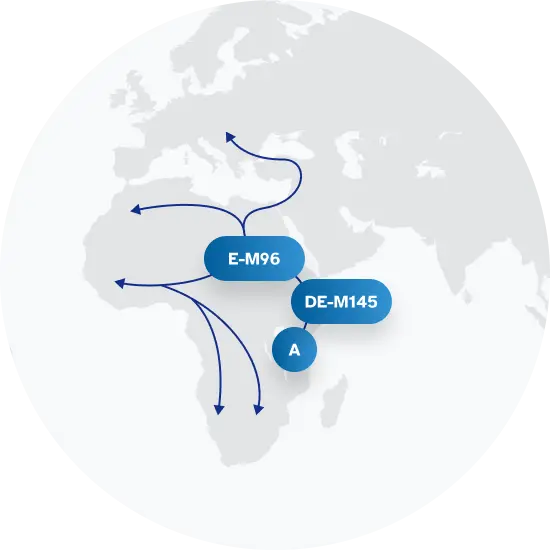Explore the Family Name Bandy
How common is the last name Bandy in the United States?
According to data from the Decennial U.S. Census, the popularity of the surname Bandy has seen a slight decrease between 2000 and 2010. In 2000, the surname was ranked 3870, but by 2010 it had dropped in rank to 4133, a decline of 6.8%. Despite this drop in rank, the actual count of individuals with the Bandy surname increased from 8426 in 2000 to 8582 in 2010, marking a growth of 1.85%. The proportion of the Bandy surname per 100k people also decreased by 6.73% over the same period.
| 2000 | 2010 | Change | |
|---|---|---|---|
| Rank | #3,870 | #4,133 | -6.8% |
| Count | 8,426 | 8,582 | 1.85% |
| Proportion per 100k | 3.12 | 2.91 | -6.73% |
Race and Ethnicity of people with the last name Bandy
The ethnicity distribution for those with the Bandy surname saw changes between 2000 and 2010, based on the Decennial U.S. Census data. The percentage of Bandys who identify as Asian/Pacific Islander increased by 63.49%, while those identifying as two or more races saw a growth of 7.19%. The largest ethnic identity among the Bandy surname is White, although it decreased slightly from 81.79% to 79.54%. Those who identify as Hispanic saw an increase of 47.13%, and those who identify as Black also increased from 13.45% to 14.43%. On the other hand, the American Indian and Alaskan Native category saw a decrease of 8.45%.
| 2000 | 2010 | Change | |
|---|---|---|---|
| White | 81.79% | 79.54% | -2.75% |
| Black | 13.45% | 14.43% | 7.29% |
| Hispanic | 1.74% | 2.56% | 47.13% |
| Two or More Races | 1.67% | 1.79% | 7.19% |
| Asian/Pacific Islander | 0.63% | 1.03% | 63.49% |
| American Indian and Alaskan Native | 0.71% | 0.65% | -8.45% |
Bandy ancestry composition
23andMe computes an ancestry breakdown for each customer. People may have ancestry from just one population or they may have ancestry from several populations. The most commonly-observed ancestry found in people with the surname Bandy is British & Irish, which comprises 54.7% of all ancestry found in people with the surname. The next two most common ancestries are French & German (23.1%) and Scandinavian (4.2%). Additional ancestries include Spanish & Portuguese, Eastern European, Nigerian, Indigenous American, and Italian.
Ready to learn more about your ancestry? Get the most comprehensive ancestry breakdown on the market by taking our DNA test. Shop 23andMe
| ANCESTRY BREAKDOWN | COMPOSITION |
|---|---|
| British & Irish | 54.7% |
| French & German | 23.1% |
| Scandinavian | 4.2% |
| Other | 18.0% |

Possible origins of the surname Bandy
Your DNA provides clues about where your recent ancestors may have lived. Having many distant relatives in the same location suggests that you may all share common ancestry there. Locations with many distant relatives can also be places where people have migrated recently, such as large cities. If a large number of individuals who share your surname have distant relatives in a specific area, it could indicate a connection between your surname and that location, stemming from either recent ancestral ties or migration.
Based on 23andMe data, people with last name Bandy have recent ancestry locations all within the United Kingdom of Great Britain and Northern Ireland.
| RECENT ANCESTRY Location | Percentage |
|---|---|
| Tyne And Wear, United Kingdom | 90.30% |
| Merseyside, United Kingdom | 90.30% |
| West Midlands, United Kingdom | 90.30% |
| Greater London, United Kingdom | 90.30% |
| Lancashire, United Kingdom | 89.70% |
What Bandy haplogroups can tell you
Haplogroups are genetic population groups that share a common ancestor on either your paternal or maternal line. These paternal and maternal haplogroups shed light on your genetic ancestry and help tell the story of your family.
The top paternal haplogroup of people with the surname Bandy is E-M4254, which is predominantly found among people with Sub-Saharan African ancestry. Haplogroup E-M4254 is descended from haplogroup E-M96. Other common haplogroups include I-DF29 and R-P312, which are predominantly found among people with European and European ancestry. Other surnames with similar common haplogroups are: Bunch, Ivy, Ivey, Busby, Oquendo, Goins, Bey, Fountain, Felder, Battle.
The most common maternal haplogroups of people with Bandy surname are: H1, H3, H. These most commonly trace back to individuals of European ancestry.
 Paternal Haplogroup Origins E-M96
Paternal Haplogroup Origins E-M96
Your paternal lineage may be linked to Ramesses III
Pharaoh Ramesses III defended Egypt in three consecutive wars during his approximately 30-year reign, but provoked dissent within his administration. Catalyzed by mounting internal strife, one of Ramesses's lesser wives, Tiye, hatched a plot to have her son, Pentawer, usurp the throne by having Ramesses III murdered along with his appointed heir. A papyrus record of the resulting trial explains that the plot failed and that all involved were tried and convicted.However, a modern CT scan of Ramesses III's mummy revealed a deep slit in his throat, reopening a case long thought closed. The embalmers went to great lengths to cover up other wounds, including fashioning a fake toe out of resin where Ramesses's real one had been hacked off, likely during a fatal attack. For thousands of years, Ramesses's burial adornments concealed the wounds that mark one of the most famous royal dramas in history. Ramesses III's paternal lineage belongs to haplogroup E-V38.
Your maternal lineage may be linked to Marie Antoinette
Because it is so dominant in the general European population, haplogroup H also appears quite frequently in the continent's royal houses. Marie Antoinette, an Austrian Hapsburg who married into the French royal family, inherited the haplogroup from her maternal ancestors. So did Prince Philip, Duke of Edinburgh, whose recorded genealogy traces his female line to Bavaria. Scientists also discovered that famed 16th century astronomer Nicolaus Copernicus traced his maternal lineages to haplogroup H.

What do people with the surname Bandy have in common?
Spoiler alert: it's complicated. People with the same last name are usually no more genetically similar than a randomly sampled group of people from the same population. That said, people with the same surname are more likely to have similar ancestries than randomly sampled individuals. The reason is the tendency of people with similar cultural or geographical backgrounds to preferentially mate with one another. That's why people who share a surname may be more likely to share traits and tendencies in common than people within the general population. Check out the percentages below to see the prevalences of tastes, habits, and traits of people with your surname compared with prevalences among 23andMe users.
Preferences
Traits
Habits
Wellness
Are health conditions linked to the last name Bandy?
The short answer is that, if there is an association between surname and health, it's usually more about your ancestry than your name. Individuals with a given surname are no more genetically similar than the general population but often have similar ancestries. The populations of people associated with those shared ancestries often have sets of genetic variations, also known as alleles, in common. Some of those alleles are associated with a greater likelihood of developing certain diseases.
Disease variant frequency by ancestry
Disease allele frequencies in populations associated with the surname Bandy are shown below. Important Note: not everyone with a disease allele will develop these health condition



















